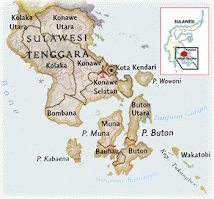Member of the House of Representatives, Republic of Indonesia, National Mandate Party.
Member of Commission IX : Health, Labor, Transmigration, Population, Food and Drug Control.
PRESENTED AT THE SIXTH ASIAN WOMEN PARLIAMENTARIANS AND MINISTERS’ CONFERENCE, September 23-24, 2008, ULAN BATOR, MONGOLIA
Governance, Accountability and Sustainability of the MDG
To face the challenges of the country’s development, in the period of 2004-2009, government of Indonesia has promoted the 3 (three) development agenda i.e :
1. To Create a Safe & Peaceful Country
2. To Create a Just & Democratic Country
3. To Improve People’s Welfare.
Agenda 3, i.e. to Improve People’s Welfare is much in line with the 8 goals of Millennium Development. And since Indonesia has signed the MDGs commitment in 2000, consequently all government development policies and programs have since then been projected to also reach the 8 goals of Millennium Development.
Indonesian Parliament
Since the amendment of Indonesian 1945 Constitution in 2002, Parliament of Indonesia is given more power to be involved together with the Government in deciding all development plans, policies and programs of the country, since the Parliament is expected to have the role to make changes, essential for fostering public participations and accountability and being a place of popular representation and an effective instrument for the creation of legislation and review of Government policy. This is implemented through routines hearings between the Government represented by its ministers with the Parliament where in Indonesia consists of 11 (eleven) Committees, each Committee is in charge to certain sector and Ministry as the following : I. International Affair, Defense, Information, II. Home Affairs, State Apparatus, III. Law, Human Rights, IV. Agriculture, Forestry, Maritime, Fisheries, V. Transport, Communication. VI. Industry, Trade, Cooperative, VII. Energy, Mineral Resources, Technology, Environment, VIII. Women Affairs, Children Protection, Religion, Social Affairs, IX. Health, Labor, Transmigration, Population, Food and Drug Control, X. Education, Tourism, XI. Finance, Banking, Development Planning.
All Government’s development plans, and policies including those to reach the Millennium Development goal as well as its budgets in each ministries are discussed and decided through the ministry meetings with the related committees.
Achievement of MDGs 3,4,5,6
In regards to the achievement of the Millennium Development Goals particularly MDGs 3,4,5,6 Indonesia has reached the followings :
Goal 3 : Promote Gender Equality and Empower Women.
Target 4 : Eliminate gender disparity in primary and secondary education, preferably
by 2025, and in all levels of educations no later than 2015.
The Indonesian government through Presidential Instruction Number 9, 2000 has laid the legal foundation for gender mainstreaming in all aspects of national development. The government has also taken strategic step to socialize gender perspective, showing her willingness to implement Gender Mainstreaming strategy, in both development program and policies as well as in Laws and regulation issued as the legal foundation for government activities.
Thanks to the gender mainstreaming strategy in all development policies and programs, in general Indonesia has made a clear progress in promoting gender equality and improvement of women in many aspects.
The main indicator is the ratio of girls to boys in primary, secondary and tertiary education, where Indonesia has almost reach the target, with ratios of 99,4 % at primary school, 99,9 % in junior secondary school, 100 % in senior secondary school, and 102,5 % in tertiary education. One of the measures used by government of Indonesia to reach the target is launching the “Nine Years Compulsory Education Program” (Wajar) for every boy and girl.
The second indicator is the ratio of literate women to men, aged 15-24 years old, which Indonesia almost reach the target with a ratio of 99,9 %, thanks to the government’s “Study Group Program A,B,C” (Kejar Paket A,B,C) launched 12 years ago to eliminate illiteration in the country.
The third indicator i.e. the share of women in wage employment in all non-agricultural sectors. In a strong patriarchal culture like Indonesia, the current value is only 33 %, still away from reaching the target of 50 %.
Similar case happens in the fourth indicator i.e. the proportion seats held by women in National Parliament which at the moment only reach 11,3 %. To overcome this, the government together with the Parliament just amended the Election Law which stipulates that only political party which put at least 30 % women as their candidates for general election which are eligible to take part at the coming General Election in 2009.
Goal 4 : Reduce Child Mortality.
The main indicator is the under-five mortality rate, where the MDGs target is 32 deaths per thousand live births in 2015. At the moment Indonesia has reached 40 per 1.000 live births so it already reach the MDGs target. However the report from BPS Susenas shows that a greater share of deaths take place in the first days, weeks or months of life, that means we have to improve the health protection program for the neonatals.
The second indicator is the proportion of one-year-old children immunized against measles where the number has increased to 72 % in infants and 82 among children of 12-23 months old which still have to be increased more to reach the target. However, at present Indonesia has immunized most of the children. By 2005, 88 % against diphtheria, whooping cough and typhoid although only half of them received the full course. 82 % against TB, 72 % against Hepatitis. With the Polio outbreak incident in 2005 the government had to revitalize its immunization program especially for polio. This included public education for the parents on the importance of immunization program as prevention measure against various diseases and higher budget allocation proposed by Parliaments to ensure good vaccine supplies and distribution as well as a more organized health system.
Goal 5 : Improve Maternal Health
Target 6 : Reduce by three-quarter, between 1990 and 2005, the maternal mortality
ratio.
Maternal Mortality Ratio in Indonesia has come down from 450 per 100.000 live births in 1990 to around 307 in 2007, and should reach 110 by 2015, it means it is still far behind the target. The causes of death are delivery complications like obstructed labour and haemorrhage, where most of them are treatable or preventable if they get easy access to skilled birth attendant (doctor, midwive) especially those living in the remote areas, who are poor, undernourished and prone to anemia. Or if they get access to effective contraceptives.
To solve this problem, Parliament supports the Government (Minister of Health) program to train more midwives to be placed in every village all over Indonesia, and improve the health services of all District Hospitals and Communities Health Services especially for emergency due to delivery complications
.
Goal 6 : Combat HIV/AIDS, Malaria and Other Diseases
Target 7 : Have halted by 2015 and begun to reverse the spread of HIV/AIDS.
Even if the current prevalence is 0,1 % nationally but at present there is no indication that Indonesia is halting the spread of HIV/AIDS, since data shows that for the past 5 years there is a fast increase of numbers of people living with HIV/AIDS, where from 1987 to March 2007 there were 8.988 cases of AIDS, out of that 1.994 died, as reported by National AIDS Commission (KPA).
In most of Indonesia, infections are still concentrated among two high-risk groups; injecting drug users and sex workers. One of most critical issues is the low use of condoms, even among commercial sex workers, who are only around half use condoms. There is thus the potential for HIV to spread rapidly. According to the Ministry of Health, there would be half a million people infected by 2010, or even a million, if the government does not take effective action.
Therefore Parliament support the government effort in combating HIV/AIDS to programs through public education, youth reproductive health education, HIV test, distributing free condoms at red-lights district, and free needles to drug users. Despite the fact that Indonesia is still supported by the Global Fund in combating HIV/AIDS, Malaria and TB, Indonesia has recently succeeded to produce its own ARV to cure HIV/AIDS and also medications to combat TB given to patients through DOTS (Directly-Observed Treatment Short-Course) program to cure 582.000 cases/year in Indonesia. Through this DOTS program, where daily doses of three or four drugs taken over six month are supervised carefully, to ensure that the patient finish the full course of the medication. Thanks to DOTS, Indonesia has already met the target of MDG which is to reverse the spread of the disease (91%). Similar case is for Malaria, when the drugs have been produced locally thus we can lower the incidents to 18,6
Million cases per year.
The Role of Women Parliamentarian
To ensure the governance, accountability, and sustainability of all the programs to meet MDGs, especially goal 3,4,5,6-the focus of the discussion in this seminars, Indonesian Parliaments and Parliamentarian through their 3 (three) function: legislation, oversight and budgeting should become the driving force for the government to fulfill all international commitment like MDGs, ICPD, Beijing Platform of Actions.
Together with the Government of Indonesia, Parliament has done the followings :
a) Amending Health Law to include Reproductive Health Right.
b) Amending Population Law.
c) Advocating the Local Parliament, since Indonesia is now entering the Regional Autonomy and Decentralization era and empowering the local government, hence the crucial role of the district government leaders to succeed the programs of achieving MDGs as well as the goals of the country development programs.
d) Improving Health Insurance Scheme for the poor.
e) To Strongly propose to the government to increase Health National Budget from 2,6 % at present to 5-6 % of the National Budget (compared to the Budget for Education which is 20 % of the National Budget).
Implementing all the above mentioned measures will ensure the government of Indonesia to reach the objective of the Agenda 3 of the Middle Term Development Agenda 2004-2009 i.e : To Improve People’s Welfare as well as achieving the targets and goals of MDGs.
Conclusion
In its serious efforts to implement gender-mainstreaming strategy, beside the
General Instruction for the implementation of Gender Mainstreaming in Regional Development, issued by the Minister of Home Affairs in a circular letter Number 132, 203 following the previous regulation on gender elation, Law No. 7, 1984 on the ratification of the convention on the Elimination of All Forms of Discrimination Against Women (CEDAW), the GOI also launches Law No. 25, 2004 on National Development Planning System, especially in Chapter 12 on the quality improvement of women’s welfare and child’s protection. In the same Law, gender is also mainstreamed in thirteen other Chapters as the basis for the implementation of gender mainstreaming strategies in each aspect of development.
However there is still discrepancy between program and policies on one side and the actual practice. Women Parliaments have to make their ways to be heard for their aspirations, especially those related to women’s interest, needs and rights. In the strong patriarchal culture like Indonesia, it is still one of the obstacles for people to really willing to listen to women’s voice, even in the parliament. Men parliamentarians are outnumbered their women colleagues and from the small number of them not all are willing to be actively involved in articulating their aspiration. In Indonesia, since women are also affected by the existing gender construction, sensitivity to women’s issue is not something given for them. This goes for both women legislative member as well as the executives. Not every woman aware of women’s rights and problem and often time they are unresponsive to the need of women. Consequently they do not always willing to support others who are fighting for those rights or participate in solving the problem. Aspiration and proposal that meets the needs of women will only accepted or get through if they are supported by many and continuously and consistently articulated in the parliamentarian hearings. But since both women legislative and executive are not fully aware of the importance of the issues, they are often times ignored. There is also absolutely no guarantee that women executives (bureaucrats) always aware of women’s interest, needs, rights, and problems.
It gets worse when it comes to actual budget allocation for the planned programs. Here, there is also inconsistency between the government gender mainstreaming strategy in its development policy and program, and the actual process of planning and budgeting. Currently, local government budget in Indonesia does not have yet gender perspective. As a result, the impact does not bring equal benefit for both women and men. Hence the role of women (and men) Parliamentarian as well as the executives who are gender sensitive on fighting for gender planning and gender budget is very crucial and should be strengthened. Especially since we are already committed to fulfill the international agreement like Millennium Development Goals, International Conference of Population Development Program Actions, and Beijing Platform of Actions, as well as our own Development Agenda.
……development, if not engendered, would be endangered…
(UNDP 1996)
References :
Edriana Noerdin et al, “Decentralization as a Narrative of Opportunity for
Women in Indonesia”, Women Research Institute, Jakarta, 2007.
Peter Stalker, “Let’s Speak Out for MDGs”, Achieving the Millennium
Development Goals, Bappenas, UNDP, Jakarta, 2007.
Tuti Indarsih Loekman Soetrisno, “The Role of Parliaments in Improving
Maternal Health in Indonesia”, London, 2007.
-------- ,“Gender Sensitive Budgeting for Education and Health
Programs in Indonesia”, New York, 2008.
-------- ,“Peranan Parlemen di dalam Usaha Memperbaiki Kesehatan
Ibu di Indonesia”, Jakarta, 2008.
































